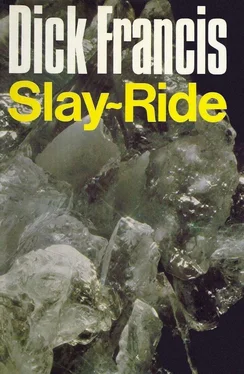I swam.
The waves seemed frighteningly big: and I couldn’t see where I was aiming unless I lifted my head right up and trod water, and that wasted time and energy.
The nearest-looking land seemed to my salt-stinging eyes to be as far away as ever. And surely Oslo fjord should be a Piccadilly Circus of boats? But I couldn’t see a single one.
Dammit, I thought. I’m bloody well not going to drown. I’m bloody well not .
I swam.
Daylight was slowly fading. Sea, sky, and distant mountains were all a darker grey. It began to rain.
I travelled, it seemed, very slowly. The land I was aiming for never appeared to be nearer. I began to wonder if some current was cancelling out every yard I swam forward: but when I looked back, the land behind was definitely receding.
I swam mechanically, growing tired.
Time passed.
A long way off, straight ahead, pinpricks of light sprang out against the fading afternoon. Every time I looked, there were more. The city was switching on in the dusk.
Too far, I thought. They are too far for me. Land and life all around me, and I couldn’t reach them.
An awful depth beneath. And I never did like heights.
A cold lonely death, drowning.
I swam. Nothing else to do.
When another light shone out higher up and to the left, it took at least a minute for the news to reach my sluggish brain. I trod water and wiped the rain and sea out of my eyes as best I could and tried to make out where it came from: and there, a great deal nearer than when I’d last looked, was the solid grey shape of land.
Houses, lights, and people. All there, somewhere, on that rocky hump.
Gratefully I veered fifteen degrees left and pressed on faster, pouring out the carefully hoarded reserves of stamina like a penitent miser. And that was stupid, because no shelving beach lay ahead. The precious land, when I reached it, proved to be a smooth sheer cliff dropping perpendicularly into the water. Not a ledge, not a cranny, to offer even respite from the effort of staying afloat.
The last quarter mile was the worst. I could touch the land if I wanted to, and it offered nothing to cling to. There had to be a break somewhere, if I went far enough, but I had practically nothing left. I struggled feebly forward through the slapping waves, wishing in a hazy way that I could surge through warm calm water like Mark Spitz and make a positive touchdown against a nice firm rail, with my feet on the bottom. What I actually did was a sort of belly-flop onto a small boat slipway bordered with large rock slabs.
I lay half in and half out of the water, trying to get back breath I didn’t know I’d lost. My chest heaved. I coughed.
It wasn’t dark; just the slow northern twilight. I wouldn’t have minded if it had been three in the morning: the cold wet concrete beneath my cheek felt as warm and welcoming as goose feathers.
Footsteps crunched rhythmically along the quay at the head of the slipway and then suddenly stopped.
I did a bit towards lifting my head and flapping a numb hand.
‘ Hvem er der? ’ he said; or something like it.
I gave a sort of croak and he walked carefully, crabwise, down the slipway towards me, a half seen, well-wrapped figure in the rainy gloom.
He repeated his question, which I still didn’t understand.
‘I’m English,’ I said. ‘Can you help me?’
Nothing happened for a few seconds. Then he went away.
So what, I thought tiredly. At least from the waist up I was safe in Norway. Didn’t seem to have the energy to drag myself uphill till my feet were out, not just for a minute or two. But I would, I thought, given time.
The man came back, and brought a friend. Ungrateful of me to have misjudged him.
The companion peered through the rain and said, ‘You are English? Did you say you are English?’ His tone seemed to suggest that being English automatically explained such follies as swimming in October in shirt and underpants and lying about on slipways.
‘Yes’ I said.
‘You fell off a ship?’
‘Sort of.’
I felt his hand slide under my armpit.
‘Come. Out of the water.’
I scraped myself onto the slipway and with their help more or less crawled to the top. The quay was edged with railings and posts. I sat on the ground with my back against one of the posts and wished for enough strength to stand up.
They consulted in Norwegian. Then the English speaking one said, ‘We will take you to my house, to dry and get warm.’
‘Thank you,’ I said, and by God I meant it.
One of them went away again and came back with a battered old van. They gave me the front passenger seat though I offered to drip in the back, and whisked me about a quarter of a mile to a small wooden house, standing near two or three others. There was no village, no shops, no telephone.
‘This is an island,’ my rescuer explained. ‘One kilometre long, three hundred metres across.’ He told me its name, which seemed to me like ‘gorse’.
His living room was small and bright, and warmed by the huge stove which took up at least a sixth of the floorspace. Seen clearly in the light he himself was a short friendly man of middle age with hands that were used for work. He shook his head over me and produced first a blanket and then, after some rummaging, a thick woollen shirt and a pair of trousers.
‘You are not a sailor,’ he said matter of factly, watching me fumble off my shirt and pants.
‘No,’ I agreed.
My wallet fell on the floor. I was surprised it was still there; had forgotten it. The Norwegian-only rescuer politely picked it up and handed it to me, smiling broadly. He looked very like his friend.
Between hopeless bouts of shivering I told them what had happened and asked them how I could get back to the city. They talked to each other about it while I dressed, first with a lot of shaking of heads but finally with a few nods.
‘When you are warmer we will take you by boat,’ said the English-speaker. He looked at the wallet which lay now on a polished pine table. ‘We ask only that you will pay for the fuel. If you can.’
Together we took out my sodden money and spread it on the table. I asked them to take whatever they liked, and after debate they chose a fifty kroner note. I urged them to double it. It wouldn’t cost so much, they protested, but in the end they put two notes aside and dried the rest for me quickly on the stove so that the edges curled. After more consultation they dug in a cupboard and brought out a bottle of pale gold liquid. One small glass followed, and a moderate tot was poured into it. They handed it to me.
‘ Skol’ they said.
‘ Skol I repeated.
They watched interestedly while I drank. Smooth fire down the throat, heat in the stomach, and soon a warm glow along all the frozen veins.
They smiled.
‘Aquavit,’ said my host, and stored the precious bottle away ready for the next needy stranger who swam to their doorstep.
They suggested I should sit for a while on the one comfortable-looking chair. Since various muscles were still trembling with weakness this seemed a good idea, so I rested while they busied themselves putting out businesslike sets of oilskins, and by the time they were kitted up my skin had returned from a nasty bluish purplish white to its more usual shade of sallow.
‘D’you feel better?’ my host observed, smiling.
‘I do.’
They nodded, pleased, and held out a spare set of oilskins for me to put on. They took me in a big smelly fishing boat back up the twinkle-edged fjord to the city, and it rained all the way. I spent the journey calculating that I had been in the water for about two hours, which didn’t prove anything in particular about the current in the fjord or the inefficiency of my swimming or the distance I had travelled, but did prove pretty conclusively that the temperature was more than one degree above freezing.
Читать дальше



